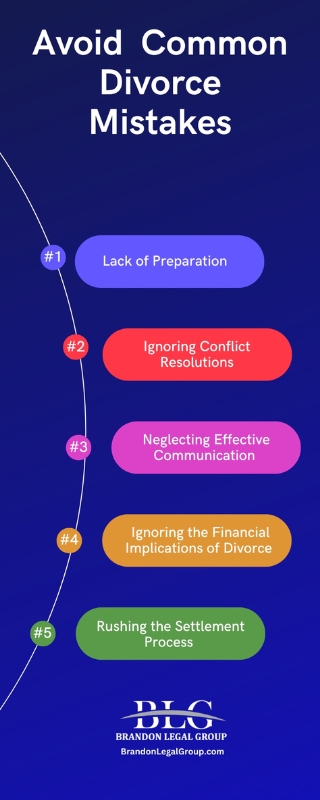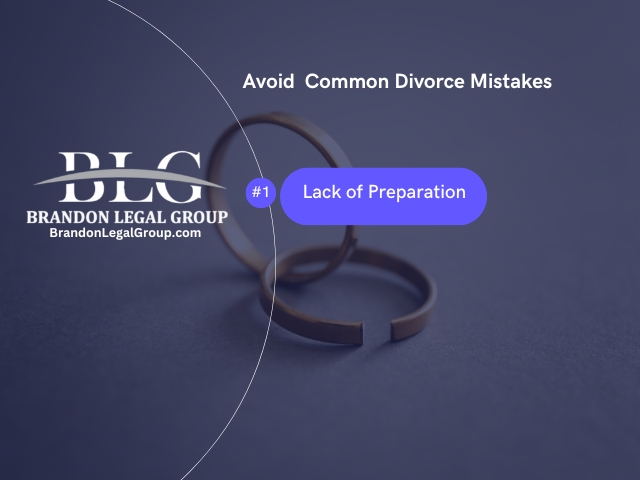 A divorce is a life-altering event that requires careful planning and preparation. Simple mistakes can easily compromise the outcome of your divorce case.
A divorce is a life-altering event that requires careful planning and preparation. Simple mistakes can easily compromise the outcome of your divorce case.
In a Florida divorce, a lack of preparation can be a critical mistake that jeopardizes your legal rights, financial well-being, and emotional stability. This article will explore the significance of preparing and provide practical guidance to help you avoid this common divorce mistake. By understanding the importance of preparation, gathering essential information, seeking professional advice, and creating a comprehensive strategy, you can set yourself up for a smoother divorce process and better outcomes.
The Consequences of Insufficient Preparation:
Divorce is a complex process with far-reaching implications. When individuals fail to prepare themselves adequately, they may face various detrimental consequences.
Financial Implications
One of the significant ramifications of a lack of preparation in a divorce is the potential for adverse financial outcomes. You may be aware of your marital assets, debts, and financial obligations with thorough preparation. However, this lack of awareness can lead to an unfair distribution of assets, improper valuation of property, and failure to account for long-term financial considerations. Therefore, you must prepare adequately to avoid economic instability and long-term difficulties post-divorce.
Emotional Stress
Divorce is an emotionally challenging process. Insufficient preparation can intensify the emotional stress and instability experienced during this time. Without preparation, you may find it challenging to navigate the emotional aspects of divorce, including grief, anger, and uncertainty. Lack of preparation can leave you unprepared for the emotional rollercoaster that divorce often entails, leading to increased stress and difficulty making sound decisions.
Lengthy and Costly Legal Proceedings
A lack of preparation can contribute to lengthy and costly legal proceedings. With the necessary documentation and understanding of the legal process, you may avoid delays, increased legal fees, and additional court appearances. Insufficient preparation can lead to misunderstandings, disputes, and a more adversarial divorce process. Not preparing adequately risks protracted litigation, further damaging your emotional and financial resources.
Gathering Essential Information and Documents
One of the fundamental aspects of preparation for a Florida divorce is gathering essential information and documents. You can better understand your financial situation and legal rights by actively collecting the necessary documentation.
Financial Documents
Collecting financial documents is crucial in understanding your marital assets, debts, income, and expenses. Essential documents to gather include bank statements, tax returns, investment portfolios, retirement account statements, property deeds, mortgage documents, credit card statements, and other relevant financial records. These documents provide a comprehensive overview of your financial situation and assist in the equitable distribution of assets and debts.
Legal Documents
In addition to financial documents, certain legal documents are essential in a divorce. These may include your marriage certificate, a prenuptial agreement (if applicable), children’s birth certificates, and any court orders or legal contracts about your marriage or family. Gathering these documents ensures you have readily available information during the divorce process.
Example: To illustrate the consequences of lacking preparation, let’s consider a fictional account of John, who decided to file for divorce without gathering the necessary documents. John underestimated the importance of financial documentation, assuming he and his spouse could resolve their divorce amicably. However, during negotiations, he discovered he needed more crucial financial information, such as his spouse’s income and asset details. This oversight could have lead to disputes over property division, as well.
Seeking Professional Guidance
While gathering information and documents is essential, seeking professional guidance is equally crucial. Engaging the expertise of divorce professionals can provide valuable insights and ensure you make informed decisions throughout the process.
The Role of a Divorce Attorney
A divorce attorney specializes in family law and can guide you through the legal complexities of a divorce. They have in-depth knowledge of Florida divorce laws, procedures, and the local court system. A divorce attorney can help you understand your rights, advocate for your interests, and provide legal advice tailored to your circumstances. By working with a skilled attorney, you can confidently navigate the legal aspects of your divorce.
Financial Professionals
In addition to a divorce attorney, financial professionals can play a vital role in the preparation process. Accountants or forensic experts can assist in valuing assets, uncovering confidential financial information, and ensuring an accurate assessment of your financial situation. Financial planners or advisors can help you understand the long-term financial implications of various settlement options and guide you toward making sound financial decisions.
Example: Let’s explore the fictional example of Lisa, who recognized the importance of seeking professional guidance. Lisa engaged in the services of an experienced divorce attorney who provided her with a clear understanding of her legal rights and obligations. Additionally, Lisa consulted with a financial planner who helped her assess the potential economic impact of different settlement scenarios. This proactive approach would have allowed Lisa to make informed decisions and protect her financial future.
Understanding Florida Divorce Laws
To effectively navigate the divorce process in Florida, it’s crucial to understand the state’s divorce laws and regulations. Familiarizing yourself with these laws will ensure you know your rights and obligations. It is highly recommended to consult with a divorce lawyer who specializes in the field to effectively navigate the complex laws and ensure your legal rights are protected.
Residency Requirements
Florida has specific residency requirements that must be met before filing for divorce. At least one spouse must be a state resident for a certain period, typically six months, before filing for divorce. Understanding and meeting these residency requirements are essential to initiating the divorce process in Florida.
Grounds for Divorce
Florida is a “no-fault” divorce state, meaning any partner can file a divorce petition regardless of fault. Instead, the primary ground for divorce in Florida is the “irretrievable breakdown of the marriage.” This no-fault approach simplifies the divorce process and focuses on resolving issues related to child custody, property division, and alimony.
Property Division Laws and Equitable Distribution
Florida follows the principle of equitable distribution when dividing marital assets and liabilities. However, a 50/50 split is not the only form of equitably distributable distribution but rather a fair and reasonable division based on various factors, including the duration of the marriage, each party’s financial contributions, and the contribution to child-rearing and homemaking.
Child Custody and Support Laws
Determining child custody and child support becomes crucial when children are involved in a divorce. Florida courts prioritize the best interests of the child when making custody determinations. Child support calculations are based on statutory guidelines, considering each parent’s income, the number of children, and the time-sharing schedule.
Spousal Support or Alimony Laws
Florida recognizes different types of spousal support or alimony, including temporary, rehabilitative, bridge-the-gap, durational, and permanent alimony. In addition, the court considers factors such as the length of the marriage, the standard of living during the wedding, and each spouse’s financial resources when determining alimony awards.
Example: In our fictional scenario, John’s lack of knowledge regarding Florida’s divorce laws significantly affected his case. He was unaware of the residency requirements and filed for divorce prematurely, resulting in delays and complications. Additionally, John underestimated the importance of equitable distribution and needed to prepare for property division negotiations. His lack of knowledge about spousal support laws also made him susceptible to unfair agreements. This lack of understanding directly impacted John’s financial and legal position in the divorce, highlighting the criticality of being well-informed.
Developing a Comprehensive Strategy
Preparing for a divorce involves developing a comprehensive strategy to guide you through the process. You can approach the divorce with a focused and proactive mindset by setting clear goals, understanding your priorities, and considering alternative dispute resolution methods.
Setting Clear Goals and Objectives
Before initiating the divorce process, take the time to reflect on your goals and objectives. For example, what are your priorities regarding child custody, asset division, and financial arrangements? By defining your goals, you can better communicate your needs and negotiate from a position of strength.
Example: John and Lisa provide an example of contrasting approaches to divorce preparation. John entered the process without clear goals, leading to confusion and an inability to advocate for his interests effectively. In contrast, Lisa had well-defined objectives, allowing her to make decisions aligned with her priorities.
Prioritizing Issues and Decisions
Divorce involves many decisions, ranging from property division to child custody arrangements. Prioritizing these issues and focusing your energy and resources accordingly is essential. You can effectively allocate your time and efforts by identifying the most critical matters.
Considering Alternative Dispute Resolution Methods
Divorce proceedings need not always end in court. Mediation and collaborative divorce are two ADR processes that might lead to less contentious and expensive settlements for legal disputes. These approaches encourage open communication, compromise, and mutually beneficial agreements, minimizing the adversarial nature of traditional litigation.
Developing a Timeline and Action Plan
Create a timeline and action plan to guide you through the various stages of the divorce process. For example, establish deadlines for gathering information, filing paperwork, and attending court hearings. A well-structured plan can provide a sense of control and ensure that you stay organized and focused throughout the divorce.
The Importance of Emotional and Mental Preparation
Divorce takes an emotional toll on individuals. Adequate emotional and mental preparation can help you navigate the emotional challenges and maintain stability during this period.
Seeking Emotional Support
Divorce can trigger various emotions, from sadness and anger to fear and uncertainty. Seeking emotional support from friends, family, or a therapist can provide a safe space to process your feelings and gain valuable insights. Emotional support can also help you maintain clarity and make sound decisions during divorce.
Taking Care of Your Well-being
Prioritizing self-care is crucial during a divorce. Take care of your well-being by engaging in activities that promote physical and mental health. Regular exercise, healthy eating, and practicing relaxation techniques can help reduce stress and improve your overall well-being. In addition, taking care of yourself allows you to approach the divorce process more resiliently and straightforwardly.
Utilizing Therapeutic Resources
Therapy or counseling can be invaluable during a divorce. A trained professional can offer guidance, coping strategies, and tools to manage the emotional challenges associated with the process. Therapy can also assist in developing practical communication skills, essential in navigating discussions with your spouse and making important decisions.
Conclusion
Lack of preparation in a Florida divorce can have significant consequences. However, you can avoid this common divorce mistake by understanding the importance of practice, gathering essential information, seeking professional guidance, understanding Florida divorce laws, and developing a comprehensive strategy. Adequate preparation sets the foundation for a smoother divorce process, protects your legal rights, and ensures better outcomes. Remember, divorce is a complex journey, but with the proper preparation, you can navigate it confidently and emerge ready for a new chapter in your life.

